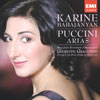Karine Babajanyan - Puccini Arias
A debut for an Armenian soprano – but does the tenor steal the show?
View record and artist detailsRecord and Artist Details
Composer or Director: Giacomo Puccini
Genre:
Vocal
Label: EMI Classics
Magazine Review Date: 9/2009
Media Format: CD or Download
Media Runtime: 0
Mastering:
Stereo
Catalogue Number: 267731-2

Tracks:
| Composition | Artist Credit |
|---|---|
| Madama Butterfly, Movement: Un bel dì vedremo |
Giacomo Puccini, Composer
Budapest Symphony Orchestra Giacomo Puccini, Composer Karine Babajanyan, Soprano Pier Giorgio Morandi, Conductor |
| Madama Butterfly, Movement: ~ |
Giacomo Puccini, Composer
Budapest Symphony Orchestra Giacomo Puccini, Composer Giuseppe Giacomini, Tenor Karine Babajanyan, Soprano Pier Giorgio Morandi, Conductor |
| (La) Bohème, 'Bohemian Life', Movement: Sì. Mi chiamano Mimì |
Giacomo Puccini, Composer
Budapest Symphony Orchestra Giacomo Puccini, Composer Karine Babajanyan, Soprano Pier Giorgio Morandi, Conductor |
| (La) Bohème, 'Bohemian Life', Movement: Donde lieta uscì (Mimì's farewell) |
Giacomo Puccini, Composer
Budapest Symphony Orchestra Giacomo Puccini, Composer Karine Babajanyan, Soprano Pier Giorgio Morandi, Conductor |
| Tosca, Movement: Vissi d'arte |
Giacomo Puccini, Composer
Budapest Symphony Orchestra Giacomo Puccini, Composer Karine Babajanyan, Soprano Pier Giorgio Morandi, Conductor |
| Manon Lescaut, Movement: In quelle trine morbide |
Giacomo Puccini, Composer
Budapest Symphony Orchestra Giacomo Puccini, Composer Karine Babajanyan, Soprano Pier Giorgio Morandi, Conductor |
| Manon Lescaut, Movement: ~ |
Giacomo Puccini, Composer
Budapest Symphony Orchestra Giacomo Puccini, Composer Giuseppe Giacomini, Tenor Karine Babajanyan, Soprano Pier Giorgio Morandi, Conductor |
| Manon Lescaut, Movement: Sola, perduta, abbandonata |
Giacomo Puccini, Composer
Budapest Symphony Orchestra Giacomo Puccini, Composer Karine Babajanyan, Soprano Pier Giorgio Morandi, Conductor |
| Suor Angelica, 'Sister Angelica', Movement: Senza mamma, O bimbo |
Giacomo Puccini, Composer
Budapest Symphony Orchestra Giacomo Puccini, Composer Karine Babajanyan, Soprano Pier Giorgio Morandi, Conductor |
| Turandot, Movement: Signore, ascolta! |
Giacomo Puccini, Composer
Budapest Symphony Orchestra Giacomo Puccini, Composer Karine Babajanyan, Soprano Pier Giorgio Morandi, Conductor |
| Turandot, Movement: Tu, che di gel sei cinta |
Giacomo Puccini, Composer
Budapest Symphony Orchestra Giacomo Puccini, Composer Karine Babajanyan, Soprano Pier Giorgio Morandi, Conductor |
| Turandot, Movement: Nessun dorma! |
Giacomo Puccini, Composer
Budapest Symphony Orchestra Giacomo Puccini, Composer Giuseppe Giacomini, Tenor Pier Giorgio Morandi, Conductor |
Author: John Steane
Giacomini’s is an Otello voice: his call to the maid Suzuki to close the shutters rings out like a command to the Captain of the Guard. By his side, Butterfly becomes Desdemona, her “rinegata ma felice” easily adaptable to fit the circumstances. Also we are inevitably fascinated by the condition of his voice, not entirely even or pliable but still distinguished by that extraordinary breadth and depth of tone out of which the high As and B flats emerge like the bright swords which Otello orders back into their sheaths.
Babajanyan remains nominally the principal singer in the recital and we duly take note. Armenian by birth, she has made her career largely in Germany, singing an impressive range of lyric and lyric-dramatic roles including Norma and the Forza Leonora. She phrases well, as in the “Vissi d’arte”, and is capable of a finely sustained soft high A, as in “Senza mamma”. There is a slight tendency for the tone to spread in quicker and more strenuous passages (we hear it in the Manon Lescaut duet), and that gives warning of limits she would be wise to observe. Best are her quite lovely performances of Liù’s arias in Turandot. These, however, are followed by Giacomini singing “Nessun dorma”, taking (what I can’t recall having heard before) both “vinceròs” in one breath. And with that the recital ends, the tenor triumphant. There are faults no doubt – but (and this is another “outsize pearl of British understatement”) it’s not bad for an old gentleman of 68!
Discover the world's largest classical music catalogue with Presto Music.

Gramophone Digital Club
- Digital Edition
- Digital Archive
- Reviews Database
- Full website access
From £8.75 / month
Subscribe
Gramophone Full Club
- Print Edition
- Digital Edition
- Digital Archive
- Reviews Database
- Full website access
From £11.00 / month
Subscribe
If you are a library, university or other organisation that would be interested in an institutional subscription to Gramophone please click here for further information.




